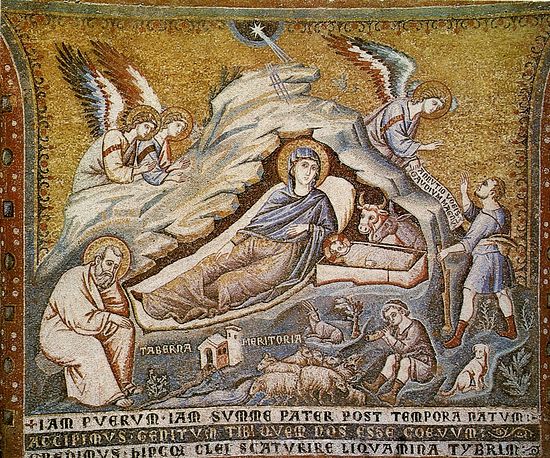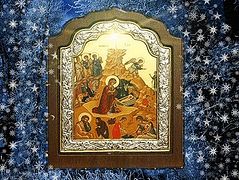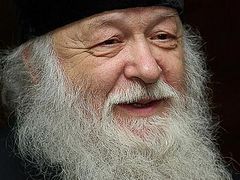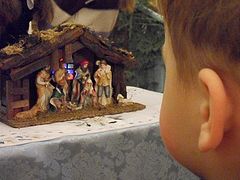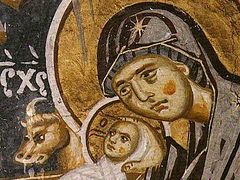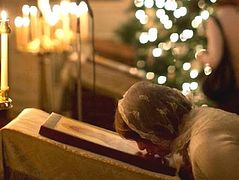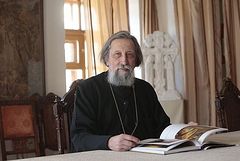All over the world these days, pre-holiday madness is becoming more and more intense. For several months now consumer behavior is being imposed on us due to New Year’s Day and Christmas (i.e. Christmas without Christ).
Not too long ago news channels were reporting on the so-called “Black Friday”, the day of massive sales. People were sometimes almost crushing each other trying to sweep goods off of store shelves. From a Christian point of view, it’s scary to think that preparation for Christmas could be understood in such a way. But then again, in Europe nowadays there is almost no connection between Christmas and Christ anyway. In fact, for the past few years there’s been an idea going around in Europe and the United States of establishing a secular holiday that would unite the Jewish Hannukah and Christmas into one interreligious shopping and party festival called “Chrismukkah”.
Journalist Yury Maximov in one of his articles writes that, “for several years in a row American authorities have been wishing the country ‘happy holidays’, avoiding the usage of the word ‘Christmas’, and an official holiday greeting card in 2006 depicted President George Bush’s dogs playing beside the White House. In Europe and in America ‘Christmas holidays’ are being renamed to ‘winter holidays’, the ‘Christmas tree’ is becoming a ‘holiday tree’, and we are now to wish each other ‘happy holidays’ rather than a ‘Merry Christmas’”.
In Russia we still use the word “Nativity” [birth], but are we aware of whose birth we’re talking about? Many modern Russian postcards say “Happy Nativity!” but whose nativity they’re talking about is not exactly clear.
If a modern person is to consider himself a Christian, then it’s absolutely necessary for him to resist the “spirit of the times”. One must take care in preparing for the Nativity of Christ.
The Church from ancient times has passed down to us the tradition of keeping the Nativity Fast. For some the fast causes additional hardships, since it coincides in time with the pre-holiday madness. But the fact that there is a fast and that we have the opportunity to properly prepare ourselves for the Nativity of Christ is great. Fasts sharpen our understanding of our place in the world and who we’re with. Are we together with the rest of the world, or is our soul somewhere else? When we give this matter some deep thought, it turns out that taking part in celebrations together with the rest of the world isn’t exactly the purpose of our being. For us modern and weak Christians the time of the Nativity fast is a small opportunity that allows us to confess our faith before God. It allows us to see how worldly we still are and how tied we are to our passions. It’s a spiritual experience that humbles us and allows us to reproach ourselves over our weaknesses.
We have said that some celebrate Christmas without Christ, but on the other hand there are some Christians for whom Christmas is just the day of birth of the Lord. What then are we anticipating in this holiday? The coming God into the world, so that He could endlessly continue feeding five thousand people (Mt. 14:13-21)? No, but rather His manifestation in the world so that He could grant us the possibility of salvation through His suffering on the Cross.
So, having an understanding of the immensity of His gift to us, let us at least during the final days of the fast step away from entertainment and read some spiritual literature. We will undoubtedly benefit ourselves by reading the Holy Fathers. The Holy Prophet David said: “With the holy man wilt Thou be holy… and with the perverse wilt Thou be perverse.” (Ps. 18:26). Let’s be attentive to our inner state, and then we’ll be able to approach the Eucharist on the feast day with a much different disposition, even though the Divine Liturgy will be the same as it always has been. Yes, the church will have decorations and it’ll be really pretty, but that’s not what’s most important. The most important thing for us to do on this feast day is to partake of the Eucharist. The feast day itself cannot change us, but what can change us is our correct preparation for it—our repentance.
No need to think that the misunderstandings on how one is to prepare for Christmas arose only in our time. If we look at the secular traditions of the nineteenth century, we’ll see that the dogmatic essence of the holiday then was also significantly dumbed down. At that time Christmas was viewed as a children’s or a “romantic” holiday, as if it is essentially just a fairy tale, or meant to be celebrated as some kind of kindergarten party.
One of my parishioners, an adult, a very respectable person, wrote a poem that described his impressions of Christmas. In the poem he would mention the moon, and the snow, and delicious pastries. Now a warm and homely atmosphere is, of course, a good thing; however, we have to move on to a different level of perception. It’s obvious that we have no right to deprive our children of the things that are tied with this holiday. But there’s also no need for an adult who has truly entered the Church to celebrate Christmas in a childish way.
When we celebrate Christmas, the first thing we have to understand is why Christ was born. This is a very important question, and if we remember the answer to it, then we will percieve the Nativity of Christ and the subsequent days of the feast in a completely different way.
In analyzing the significance of this feast, we are precisely analyzing the dogmatic side of the birth of Christ, who is both God and man.
Remember that the birth of Christ was revealed to the magi and the shepherds, but was hidden from the knowledge of satan. It was only when satan had temped Christ that he tried to find out if it is Him who was to come, or not. And when the Lord forbade the demons to say that he was the Son of God, he did so for a few reasons, one of which was to give the apostles enough time to understand the truth about Him. The Cross was also needed, and it was not without reason that the Lord had said that His hour has come. If the apostles or demons had begun speaking about Christ openly, then more obstacles would have arisen during His ministry. There’s also a reason why Christ is called the “Wise One” in the Paschal hymns. You would think that we would use the word “cunning” when referring to someone who’s offended us by some form of deceit. But in the Paschal sermon of St. John Chrysostom it is said that “hell swallowed the bait,” meaning that the Lord, having suffered and died on the Cross, descended into hell, and hell was destroyed, after which Christ brought out the righteous of the Old Testament with him. Everything happened in accordance with the will of God, and satan was not given knowledge of the time of Christ’s coming, otherwise he would have tried to interfere with the redemption of mankind, for whose sake the Lord came.
There is a very important dogmatic question that we need to understand in order to get to the essence of the Nativity, and that is the virginity of the Most Holy Theotokos. We know that in the Book of Psalms the prophet David says “I was conceived in iniquities, and in sins did my mother bear me”. As we know, the consequences of the original sin are transferred from parent to child when one is born in a natural way.
Therefore the Lord, to whom all things are possible, chose such an amazing and miraculous way of becoming incarnate. Could not the Lord have just saved us by His own will and decision? Of course He could, but we ourselves wouldn’t be able to receive salvation in such a way due to our fallen nature. If we compare ourselves with Adam, with the qualities he had while he was in Paradise, then we will see how much we’re not like he was. And so it was necessary for the Lord to become man, in order to bring mankind out of the bonds of sin. Our redemption was necessary. It was necessary for Christ to be crucified and overcome death in order to redeem us from the captivity of death and hell. And in this case, being born from a Virgin was something necessary and significant. The virginity of the Mother of God allowed the Lord to become incarnate with a body that has all of our weaknesses and requires sleep, food and rest, but at the same time comes from the consequences of the original sin.
What happened during the Incarnation, when the Holy Spirit descended upon the Mother of God, was something miraculous and something that will never happen again. She had agreed, having received the glad tidings from the Archangel Gabriel as obedience from God, to become that very door through which Christ would come into the world as both God and man. And so the Holy Spirit descended upon the Virgin Mary. What took place then was not an ordinary birth, affected by human passions. Christ had received His body from the Virgin without receiving the consequences of the original sin. I’d like to repeat this thought again: the Lord, having become a man, was free from the original sin, even though in essence His flesh is like ours. If Christ were born from a woman in an ordinary way, he would not have become both perfect God and perfect man. So, His unique way of birth enabled Him to be entirely free from evil, to be completely pure…


